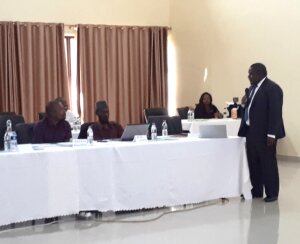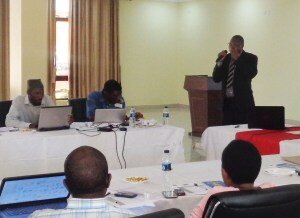Working with the Malawi Ministry of Health

Kassim J Kwalamasa of the REACH Trust in Malawi talks about the Ministry of Health's (MOH) reception and support of PERFORM2Scale.
The PERFORM2Scale program aims to build capacity of District Health Management Teams (DHMTs) to improve their planning and decision-making in order to improve workforce performance towards achievement of Universal Health Coverage in Malawi. It seeks to achieve this through the implementation of a Management Strengthening Intervention (MSI), using an action research cycle with DHMTs to identify specific workforce problems and solve them. The first phase of PERFORM2Scale in Malawi covers the three districts of Dowa, Ntchisi and Salima. To ensure embedment and sustainability, REACH Trust has, from the onset of the program, put in place measures to facilitate ownership and scale up.
Stakeholder engagement
REACH Trust engaged with the Quality Management Directorate of the Ministry of Health (the Directorate) in the promotion and running of PERFORM2Scale. The Directorate believes that good and strong leadership is needed if the delivery of quality healthcare services is to be achieved. The Directorate has therefore welcomed the PERFORM2Scale MSI and emphasised to the participating DHMTs that the initiative is not only a REACH Trust program but also a Government program that will address some elements in the Malawi Health Strategic Plan. The Directorate has managed all communication/correspondence related to PERFORM2Scale and the districts, which has made working with DHMTs relatively easy. “We take this program very seriously. We want to see those ideas coming to fruition,” the Director, Dr. Andrew Likaka, stressed.
Addressing a real gap in the health system

The Directorate quickly aligned with PERFORM2scale because the programme aligns with the Government’s plan for management strengthening and provides a positive mechanism to address real gaps in the Malawi health system at district level. Speaking at the opening of MSI Workshop 1 at Linde Motel, in Dowa District, in June 2018, the Director, Dr. Andrew Likaka, indicated that poor and weak leadership constitutes one of the major reasons for poor quality of services delivered in public facilities. He noted that with the strong leadership PERFORM2Scale is geared to develop, most problems that are faced at district level can be addressed by the DHMTs.
The Director lamented that there are some partners interested in poor leadership, as it can allow for easier decisions without proper accountability, and in the end compromise the quality of health care service because their activities are not aligned to government or MoH plans. “Unfortunately many partners would like to support short term projects because their interest is to have weak leadership that can accept whatever intervention they bring without vision of long-term impact. Such projects do not have sustainability plans as they are often short-term and never evaluated…the PERFORM2Scale Program is coming from the priorities that the Ministry of Health set and it will address leadership and governance.” He said there were lessons to be learned by the Malawi Government from PERFORM2Scale.
The zeal to own the intervention was further expressed by the Deputy Director of Clinical Services in the Ministry of Health, Dr Nedson Fosiko, when he attended the opening of MSI Workshop 2 in September: “I think that PERFORM2Scale is exactly the tool that DHMTs need. It’s something we really need to master and to do the best we can… our standards should go up. I will be happy to be part of the winning team”. To emphasise his point, he reminded the DHMTs of the eight objectives of the Health Sector Strategic Plan (HSSP2); emphasising the need to increase access to quality of care as well as the importance of health systems strengthening. He outlined four key objectives of HSSP2 and priorities for the Ministry of Health as follows:
1) Take care of health workers
2) Do what we can with what we have
3) Engage community (starts with us)
4) Efficiency (eg make sure drugs are not stolen)
He confidently said; “This intervention will help us to take care of all of those (the four points above), if we use it.” From the foregoing, it appears that institutional support for the scale-up of the intervention has already been secured and that the MSI is viewed as a promising tool to address the problems of poor and weak leadership in the health system, using available resources already in the system, and delivering according to some elements of the HSSP2.